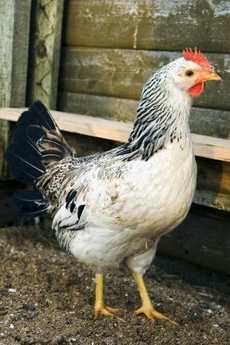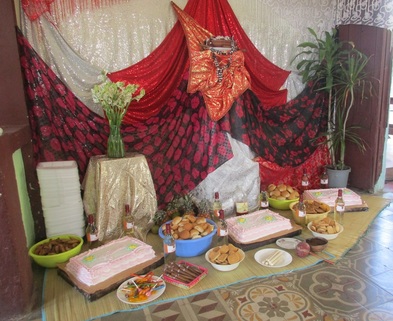
In the Lucumí religion, animal sacrifice does exist as a practice. And, we can't deny that it's an aspect of the religion that causes contention because it's so open to misunderstanding. A growing number of practitioners of the religion disregard protocol or lack proper training in this matter. And, there are other people who, for one reason or another, appropriate our belief system for their own ends and kill animals in ceremonies that have nothing to do with our religion. An untrained or self-proclaimed "santero" may throw a plastic bag full of decapitated chickens into the river, where other people, out on a walk, find it washed ashore. Or, he may mistreat or mishandle the animals to be sacrificed, drawing the attention of concerned neighbors. This kind of behavior naturally creates a public spectacle, and it results in bad press for us all. Thankfully, it's not the norm. Animal sacrifice is not done in the way that the media usually shows it, and it's not done as frequently as most people think.
A priest who has been properly trained in Lucumi practices knows that sacrifices must be done in a particular way and the ebo (offering) dealt with appropriately. We respect the environment and don't pollute or contaminate the natural world. We don't leave animal carcasses in places where they will shock and upset people, or cause health problems for the community. When stories appear in the papers about "santería remains" that have been discarded in an improper way, or animals that have been tortured by so-called santeros, those of us who practice the religion in a responsible way are the first to feel outrage. Such incidents disguise and distort who we are and what we believe.
Sacrifice takes many forms

Fresh fruit is another common offering to the orishas, along with root vegetables like squash ad sweet potatoes. We can cook food for the orishas (adimus) and share our meals with them. Each orisha has his or her favorite dishes, and the time and love we put into preparing them shows a form of devotion. When we offer them food, it represents a sacrifice of time, energy and expense, and creates a bond between us and the Divine. We can put flowers on the altar or light candles. We can decorate their soperas (receptacles where the orishas live) with beautiful embroidered clothes. We can give the orishas small presents that they like, such as a fan for Oshun, or a small toy for Elegua. Our life as religious people consists in large part of making ebo, but most of the time, it doesn't involve animal sacrifice.
When an orisha worshipper goes for a consulta (divination, or reading with shells), if the reading comes in osorbo (with obstacles or problems), an ebo needs to be identified that will help solve the problem. A responsible diviner begins with the simple and easy solutions, and only mentions the possible sacrifice of an animal if every other option is rejected first. If an animal is called for to save someone's life or resolve some other serious problem, it should be done by a fully initiated priest or priestess who knows how to kill the animal swiftly and with the minimum of suffering. There is a strict protocol to follow. The kind of animal is determined according to the orisha receiving the offering - we give a "feathered animal" (hens, roosters, guinea hens, doves) or on more rare occasions a four-legged animal, usually a goat. We don't sacrifice domestic pets like cats and dogs or other animals like horses. And, we certainly don't do human sacrifice. It seems ludicrous in this day and age that the media would make these accusations against us, yet sometimes they do.
When an animal is offered, it's blessed by those present at the ceremony. We sing and thank the animal for giving its life. The person who offers the animal is very conscious of the fact that the animal is dying on his behalf, and should express the proper humility and gratitude. The ceremony is carried out in a private space, with great seriousness. Afterward, unless the animal has been used to clean the person of some terrible illness or serious witchcraft, the people who participated in the ceremony prepare and eat it in a communal meal. In the event the animal cannot be eaten, the diviner determines how to dispose of it properly. Wherever it goes, it must not contaminate the earth or the waters, and it should not cause other people fear or expose them to potential health problems. In the countryside in Cuba, the animal carcass can be thrown on the roof of the house, where vultures will devour it within the hour. In urban areas in the developed world, the carcass usually ends up in the garbage can. If divination requires that it be left in some other place, like on the railroad tracks or at a crossroad, the diviner must think carefully about how to do that in the least intrusive and offensive way possible. If an isolated area can be found, fine. Otherwise, the ebo might be placed there only for a few moments while prayers are said, and then removed and placed in the garbage once the symbolic act has been performed. Our religion adapts itself to modern life, and we need to make modifications in the way we dispose of ebos to do the minimum amount of harm to the world we live in.
Traditions must be respected

Today, many people are opposed to the killing of any kind of animal, and yet, not all of these people are vegans or vegetarians. They've created a massive disconnect in their minds between the living animal and the package of chicken breasts they buy at the store. They eat meat at home and in restaurants, without thinking about the animals that died to provide them with that food. Our religion teaches us to honor our ancestors and respect traditions. Our ancestors were, by and large, poor people who didn't have meat in their diet every day. But, when it was necessary to sacrifice a hen or a goat to make ebo, they did it. They offered the animal first to the orishas, and then nourished their bodies with food they had made sacred by praying over it. Today, when we sacrifice an animal, it's with the same desire to connect our bodies, minds and spirits to our actions, to take ownership and responsibility for what we do, to do it with respect and gratitude, to control excesses and not go to extremes, not create public spectacles or hazards, and to above all, follow religious protocol in these matters, so our actions are not taken out of context and judged in a bad light.
We have protection under the constitution of the United States to practice our religion in peace, and this includes the right to do animal sacrifice in a religious ceremony when necessary. But, although it is our legal right, we're often challenged by people who think the constitution doesn't stretch to include us. We've experienced discrimination, prejudice and hate crimes for our beliefs. When the media misrepresents us and portrays us all in a negative light, it fuels the fear and suspicion some people have of those who are different from them. Our religion comes from Africa via Latin America. Although today it's practiced by people of all races, ethnicities and backgrounds, it still has an aura of the foreign about it. It's easy for other people to point fingers at us and find fault with what we do, and yet, when we start to deny people their constitutional rights on the basis of religious discrimination, we're opening the doors to other problems. If you deny us our constitutional rights today, who will protect your rights tomorrow when someone wants to take them away?
 RSS Feed
RSS Feed
